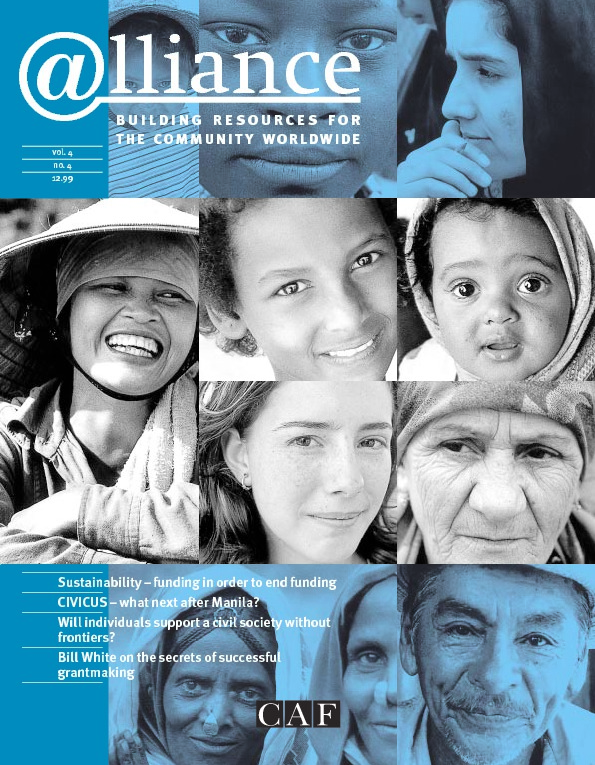The starting point for Ashoka’s Citizen Base Initiative (CBI) is the vast explosion in the number of citizens’ organizations (COs) and the realization that the overwhelming bulk of funding for them has to come from citizens themselves, from the grass roots. The CBI is designed to stimulate COs to start building this base.
The initiative is now up and running in five countries. Brazil and Thailand were the first two. South Africa and Bangladesh are in the early stages and India is just beginning.
The vision
Ashoka founder and president, Bill Drayton, compares this explosion of citizens’ organizations with ‘the emergence of the competitive business sector three centuries ago’. ‘Every other part of society that has become a permanent, safe, secure part of society, whether it’s religions or business or trade unions or social clubs or sporting clubs, has built a grass-roots broad base of support for itself.’
Many people don’t believe it’s possible to do this. ‘If you asked the typical Brazilian CO they will say oh, Brazilians don’t give, that’s a quaint Anglo-Saxon custom. This is nonsense. If you look at the schools of Brazil every neighbourhood gives a ton of money and is able to organize the most amazing things.’ According to Drayton, this is probably the central strategic need for the field. The citizen sector lags behind simply because it’s so new.
His vision is an ambitious one: in six years’ time he wants to see every Brazilian working in a CO. All around them there will be successful organizations that have a competitive advantage because they have a broad base of citizen support. ‘If you are in an environment or human rights organization that doesn’t have a citizen base, you will have competitors all around you who do. This will give them a competitive advantage, make them more independent, less fearful. You are going to say to yourself, if that organization can do it, why can’t we? That’s the dynamic, that’s where you tip the whole thing.’
The strategy
The CBI is a three-tier strategy. The first tier involves a competion — this year 10,000 Brazilian COs were invited to enter. ‘The idea is very simple,’ explains Drayton. ‘If you are a CO, come to us with a concrete, realistic, preferably interesting idea about how you will build a citizen base. We will help you succeed if you win the competition.’ Winners will have half a stipend for a staff member to implement the idea paid and will receive specialist help, pro bono, in areas such as marketing, certification, raising visibility, and connecting with others in a similar situation.
With six to ten winners every year, after six years there will be 40 or 50 organizations in a country that have succeeded, with 20 or 30 per cent of their income coming from a broad citizen base. ‘They will have found a segment of society that really cares about their issue. They will have figured out how to make themselves important to those people. And others will copy them, they will say, maybe we can do that too’ — especially as Ashoka will be helping make their successes visible.
The second tier of the strategy deals with a larger number of groups than the first.
The Ashoka-McKinsey Center on Social Entrepreneurship, physically located in the McKinsey offices in Sao Paulo, has developed a challenging multi-day game which involves people from business and the foundation sector as well as a group of CO leaders. Together they develop a strategy for achieving economic independence, including building a citizen base.
Some early evaluation, nine months on, found that 75–85 per cent of the organizations who had gone through this game were actively implementing the strategy. The Ashoka-McKinsey relationship is now spreading to Argentina, Mexico and India.
Ashoka is also actively looking for the right global partner, or perhaps a couple of regional partners, to work with them in the communications area — an area in which many COs are very lacking.
The third tier of the strategy is a mass one. Ashoka is pulling together case examples of successful COs that have built a broad citizen base for themselves. The end product will be a book called 150 Ways that Citizen Organizations can be Rich and Independent Without Foundations or Governments. It is hoped that this will come out before the end of the year 2000.
Future goals
By the end of 2002 Ashoka expects to have CBI programmes operating in at least 16 countries, and to have developed a model for ‘franchising’ the CBI programme, thus making it widely available to any of Ashoka’s 33 country offices or other organizations that are interested.
For more information about CBI, contact Lisa Cannon, Director of Research and Outreach, CBI, at Ashoka: Innovators for the Public’s headquarters in Arlington, USA.
Tel +1 703 527 8300
Email lcannon@ashoka.orgWebsite http://www.changemakers.net


Comments (0)